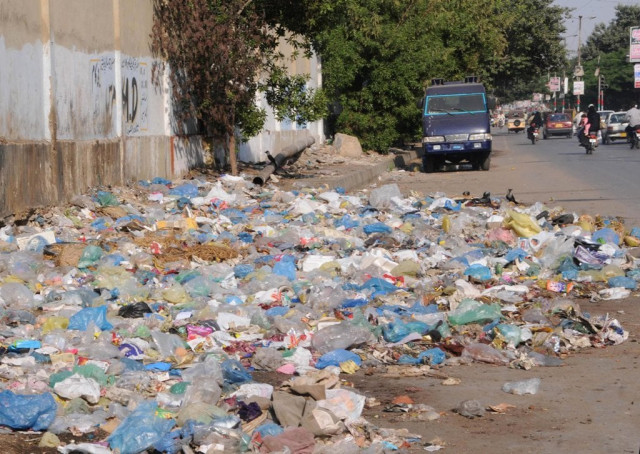Water, sanitation conditions: SC seeks Sindh government's reply to contempt of court plea
Inquires update from AG whether a video showing poor sanitation conditions shown yet to MPAs

Documenting reality: A video was prepared by a court-appointed judicial commission, headed by Justice Muhammad Iqbal Kalhoro of the SHC, during its visits to inspect the water resources, water filtration and sewerage treatment plants in Karachi and other districts of the province. PHOTO: INP
A larger bench, headed by Justice Mushir Alam, directed the Sindh AG to file comments on behalf of the provincial chief secretary and other authorities. Also comprising Justices Maqbool Baqar and Faisal Arab, the bench was hearing a petition seeking the provision of potable drinking water and improved sanitation conditions in Sindh.
Complying with SC orders, Sindh doubles water, sanitation budget
The petitioner, Shahab Usto, informed the bench that the Sindh government had failed to comply with SC's directives regarding the rehabilitation of filtration and sewage treatment plants in the city and testing the effluent produced by industries and found at the Karachi harbour.
It was directed that the managing directors of the Sindh Industrial Trading Estate (SITE) and the Karachi Water and Sewerage Board (KWSB) must comply with the directives with regard to the rehabilitation of filtration and treatment plants and discharge of effluents from industries.
The bench was informed that the Karachi Port Trust (KPT) and KWSB had failed to take measures to prevent pollution at the harbour in accordance with the SC's directives. It was alleged that the government functionaries, including the local government (LG) and KWSB, had failed to comply with the top court's orders about the functioning of water filtration plants and sewage treatment plants TP-I and TP-III in the metropolis.
Supreme Court comes down hard on Sindh government
In June, a SC-appointed judicial commission constituted to implement the apex court's order, had issued show cause notices to the task force chairperson, health secretary, KWSB managing director (MD), SITE MD, LG secretary, public health engineering secretary, Karachi Port Trust chairperson and others who had not complied with the top court's March 16 orders.
During Monday's proceedings, the Sindh AG Barrister Zamir Ghumro, informed the SC bench that in compliance of the court's directives, the government had ordered the audit of the North Sindh Urban Services Corporation (NSUSC) - a private company established by the Sindh government with a loan from the Asian Development Bank (ADB) to execute water and sanitation development schemes in different districts.
He further said that the government had also withdrawn the employees given to NSUSC. However, the AG complained that the government was facing difficulties in executing the pending development schemes due to the non-provision of the required funds by the foreign donor.
Judicial commission orders testing of water supplied to citizens in Sindh
The Sukkur district municipal corporation authorities informed the apex court that the projects initially launched under the NSUSC had been successfully executed, but the remaining projects launched in the second phase could not be executed as ADB had withheld the remaining amount of the loan.
The judges directed the AG to file a reply to the contempt of court application on behalf of the concerned provincial authorities, explaining as to why the court's directives had not been implemented despite the lapse of months.
They also asked him to submit complete details of the ongoing development schemes, which were launched under the NSUSC. He will also mention how much of the funds were spent on these schemes and how much more was required.
Apex court shocked at state of affairs
The Supreme Court (SC) asked on Monday the Sindh AG whether a video, prepared by the court-appointed judicial commission regarding the supply of filthy drinking water and poor sanitation conditions, had been shown to the members of the Sindh Assembly.
Commission wants five-year records of water, sanitation schemes
The video was prepared by the commission, headed by Justice Muhammad Iqbal Kalhoro of the Sindh High Court, during its visits to inspect the water resources, water filtration and sewerage treatment plants in Karachi and other districts of the province.
The judges had expressed their shock and concern over the state of affairs in the province, as the video was shown to them in the courtroom.
Therefore, the bench members had directed the Sindh Assembly's speaker to show the same video to the lawmakers.
Judicial commission rejects task force’s report on water, sanitation
Taking up the matter, the three-member larger bench found that the situation had not changed, as orders passed by the court had not been complied with by the relevant authorities.
The bench's head, Justice Mushir Alam, inquired from Ghumro on whether the assembly speaker had shown the video to the elected representatives as asked by the court in March.
"The video of the judicial commission shows what kind of water the citizens are consuming," the judge remarked, addressing the top government law officer.
Ghumro expressed his unawareness on the matter, replying that the court had not given any specific direction to him to get the same done.
Justice Alam reminded him that the court had given a specific direction to Sindh Assembly's speaker to make arrangements for showing the video to the lawmakers. The judge asked the AG to inquire from the assembly speaker on whether or not the video had been shown to the MPAs in compliance of the court's directive.
Form committee to resolve water scarcity, sanitation issues, SC tells Sindh govt
The AG was directed to submit a report to the court in this regard.


















COMMENTS
Comments are moderated and generally will be posted if they are on-topic and not abusive.
For more information, please see our Comments FAQ